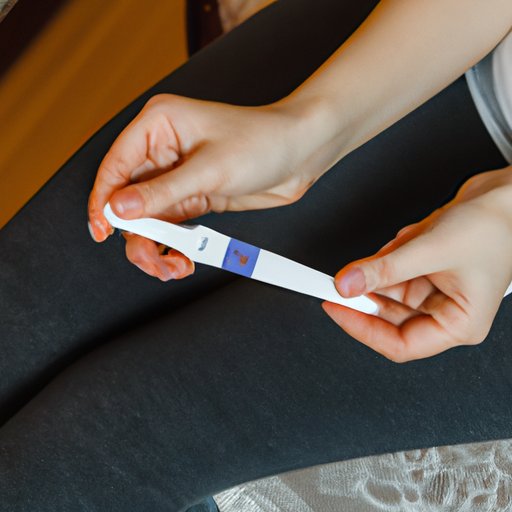Introduction
If you’re trying to conceive or think you might be pregnant, it’s important to understand the early signs and symptoms of pregnancy. Pregnancy symptoms can be a sign that your body is undergoing the changes required to support a growing baby. In this article, we’ll explore how soon you can expect to experience pregnancy symptoms and offer tips on how to recognize and manage them.
The Early Signs: Understanding Pregnancy Symptoms Before a Positive Test
Some women experience pregnancy symptoms even before a positive pregnancy test. These early signs can include nausea, breast tenderness, fatigue, and even a missed period. It’s important to tune in to your body’s signals to recognize these early symptoms. Pay attention to changes in your appetite, energy level, and mood. If you suspect you might be pregnant, it’s a good idea to take a home pregnancy test, which can usually detect a pregnancy as early as two weeks after conception.
How Soon After Conception Can You Expect Pregnancy Symptoms?
Pregnancy symptoms can occur as early as a few days after conception, but most women begin to experience symptoms around four weeks after the last menstrual period. However, the timing can vary depending on factors such as age, overall health, and hormone levels. Women who are older or have underlying health conditions may experience symptoms earlier or later than average. Additionally, the menstrual cycle can influence when pregnancy symptoms appear — for example, women with irregular or shorter than usual cycles may experience symptoms earlier than expected.
Feeling It: Early Pregnancy Symptoms to Watch For
Some of the most common early pregnancy symptoms include nausea and vomiting, fatigue, breast tenderness, and frequent urination. These symptoms are caused by hormonal changes in the body and can be challenging to manage. For example, many women experience nausea and vomiting in the first trimester, but there are several strategies you can use to alleviate this symptom. Some women find that eating small, frequent meals throughout the day, or drinking ginger tea or taking ginger supplements can help with nausea. If you’re experiencing fatigue, it’s important to get plenty of rest and try to prioritize sleep.
How to Recognize the Signs of Pregnancy Before a Missed Period
Some women experience pregnancy symptoms even before their missed period. This can be attributed to the fact that the fertilized egg begins to implant in the uterine wall about a week after ovulation, which can cause a range of symptoms. If you suspect you might be pregnant, you can take an early detection test which can detect pregnancy hormones in the urine as early as six days before a missed period. Additionally, you can track other symptoms such as changes in cervical mucus or basal body temperature to get a sense of whether you might be pregnant.
The Waiting Game: Understanding Pregnancy Symptoms in the First Trimester
The first trimester of pregnancy can be an anxious time for many expectant mothers, as it’s a period of great change in the body. Many women experience symptoms such as morning sickness, fatigue, and mood swings in the first trimester. It’s important to communicate any concerns or questions you may have with your healthcare provider, who can offer guidance and support. Additionally, it’s important to take time for self-care during this period, by getting enough rest, eating a healthy diet, and staying active if possible.
Pregnancy Sign 101: What to Expect in the First Few Weeks
It’s important to remember that pregnancy symptoms can vary greatly from person to person. Some women may experience only a few symptoms, while others may experience many. Additionally, symptoms can come and go throughout the pregnancy. It’s a good idea to keep track of symptoms in a journal or on a mobile app, and communicate any changes with your healthcare provider. By staying informed, you can help ensure a healthy pregnancy for both you and your baby.
Conclusion
If you’re trying to conceive or suspect you might be pregnant, understanding the early signs and symptoms of pregnancy can help you prepare for the changes to come. By staying attuned to your body’s signals, practicing self-care, and communicating with your healthcare provider, you can help ensure a positive pregnancy experience. Remember, every pregnancy is different, so trust your instincts and seek support when you need it.
